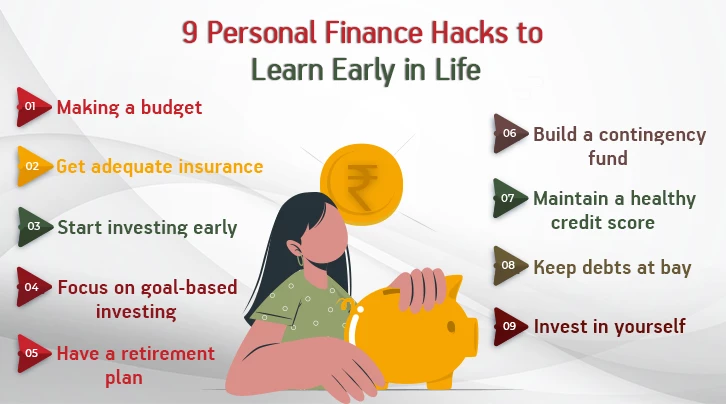जीवन में जल्दी सीखने के लिए 9 पर्सनल फाइनेंस हैक्स
हमारे व्यक्तिगत वित्त को कुशलतापूर्वक प्रबंधित करना एक सुखी और स्वस्थ जीवन जीने के लिए आवश्यक कुंजियों में से एक है। जबकि धन प्रबंधन एक आजीवन प्रक्रिया है, कुछ वित्तीय आदतों को जल्दी सीख लिया जाता है।
यहां नौ पर्सनल फाइनेंस हैक्स की सूची दी गई है, जिन्हें जीवन में जल्दी सीखना चाहिए।

- बजट बनाना
बजट बनाना यह सुनिश्चित करने का सबसे अच्छा तरीका है कि अगली तनख्वाह मिलने तक आपके पास पर्याप्त पैसा हो। एक यथार्थवादी बजट बनाने के लिए, आपको पहले अपनी आय को नोट करना चाहिए, नियमित और निश्चित खर्चों जैसे ईएमआई, उपयोगिता बिल आदि का निर्धारण करना चाहिए, वित्तीय लक्ष्य निर्धारित करना चाहिए और इन लक्ष्यों के लिए एक समर्पित फंड को अलग रखना चाहिए। एक बजट होने और नियमित अंतराल पर इसकी निगरानी करने से आपको आर्थिक रूप से समझदार बनने में मदद मिल सकती है। - पर्याप्त बीमा प्राप्त करें
अपने प्रियजनों के स्वास्थ्य और वित्तीय कल्याण को सुरक्षित करना आपके व्यक्तिगत वित्त का एक अभिन्न अंग है। जब आप आसपास न हों तो अपने परिवार की वित्तीय भलाई सुनिश्चित करने के लिए जीवन बीमा खरीदना समझदारी है। पर्याप्त स्वास्थ्य बीमा खरीदना भी महत्वपूर्ण है क्योंकि अनावश्यक चिकित्सा व्यय आपकी जेब में छेद कर सकते हैं। आप जितनी जल्दी यह बीमा खरीदेंगे, आपको उतना ही कम प्रीमियम देना होगा। ऐसा इसलिए है क्योंकि उम्र के साथ स्वास्थ्य संबंधी समस्याओं से पीड़ित होने की संभावना भी बढ़ जाती है। यह मदद करेगा यदि आपने एक महत्वपूर्ण वित्तीय संकट से बचने के लिए अपने घर और कार जैसी अन्य संपत्तियों का भी बीमा किया है। - जल्दी निवेश करना शुरू करें
जब आप जल्दी निवेश करना शुरू करते हैं, तो आपके पास एक कोष बनाने के लिए अधिक समय होता है। नियमित रूप से एक छोटी राशि का भी निवेश करने से आपको लंबे समय में पर्याप्त धन संचय करने में मदद मिल सकती है। सिस्टमैटिक इन्वेस्टमेंट प्लान (एसआईपी) जैसे निवेश का रास्ता अपनाने से आपको समय-समय पर म्यूचुअल फंड में छोटी राशि का निवेश करके धन बढ़ने में मदद मिल सकती है। छोटी उम्र से ही ऐसा करने से आपके जीवन में वित्तीय अनुशासन भी विकसित हो सकता है। - लक्ष्य आधारित निवेश पर ध्यान दें
अलग-अलग वित्तीय लक्ष्यों के लिए अलग-अलग निवेश करने की आदत विकसित करें। लक्ष्य आधारित निवेश सपनों की जिंदगी जीने का आजमाया हुआ फॉर्मूला है। जब आप अपने लक्ष्यों के अनुसार अपने वित्त और निवेश की योजना बनाते हैं, तो इन लक्ष्यों को प्राप्त करना अधिक प्रबंधनीय हो जाता है। - एक सेवानिवृत्ति योजना लें
यहां तक कि अगर आपने अपने शुरुआती 20 के दशक में कमाई शुरू कर दी है, तो अपनी पहली तनख्वाह से ही अपनी सेवानिवृत्ति की योजना बनाना बुद्धिमानी है। पिछली पीढ़ियों के विपरीत, आज सेवानिवृत्त वर्षों में समान जीवन स्तर बनाए रखने के लिए नियोक्ता या सरकारी पेंशन योजनाओं पर भरोसा नहीं किया जा सकता है। सेवानिवृत्ति योजना बनाने के लिए म्यूचुअल फंड निवेश जैसे निवेश के तरीकों पर विचार करने का समय आ गया है। एसआईपी के साथ, आप हर महीने एक पूर्व निर्धारित राशि का निवेश करके सेवानिवृत्ति के लिए एक बड़ा कोष इकट्ठा करके सेवानिवृत्ति की योजना बनाना शुरू कर सकते हैं। वास्तव में, जल्दी शुरू करके, सही संपत्ति में निवेश करके, और नियमित अंतराल पर अपना एसआईपी बढ़ाकर, आप एक बड़ी सेवानिवृत्ति किटी जमा कर सकते हैं या अपने विचार से पहले सेवानिवृत्त भी हो सकते हैं। - एक आकस्मिक निधि बनाएँ
आपात स्थिति दरवाजे पर दस्तक नहीं देती है। वे अघोषित रूप से आते हैं। आकस्मिक चिकित्सा व्यय, नौकरी छूटने, या अन्य कारणों जैसे आवश्यकता के समय में आपातकालीन या आकस्मिक निधि होना हमेशा काम आ सकता है। आदर्श रूप से, आपको आपातकालीन निधि के रूप में कम से कम छह महीने के खर्च के बराबर राशि अलग रखनी चाहिए। - एक स्वस्थ क्रेडिट स्कोर बनाए रखें
एक स्वस्थ क्रेडिट स्कोर आपकी साख और वित्तीय जिम्मेदारी का संकेतक है। देर से बिल भुगतान, बाउंस हुई ईएमआई, क्रेडिट कार्ड की बकाया राशि का भुगतान करने में देरी आपके क्रेडिट स्कोर को नकारात्मक रूप से प्रभावित कर सकती है। जब आप ऋण के लिए आवेदन करते हैं तो क्रेडिट स्कोर एक महत्वपूर्ण भूमिका निभाता है क्योंकि बैंक आपके ऋण के वितरण, राशि और ब्याज दर को आपके स्कोर के आधार पर तय करते हैं। एक स्वस्थ क्रेडिट स्कोर का अर्थ है कि आप उधार लिए गए पैसे का भुगतान करने में सक्षम हैं और भुगतान में चूक की संभावना कम है। - कर्ज से दूर रहें
अपने छात्र ऋण को प्राथमिकता पर चुकाना, अपने क्रेडिट कार्ड के बिलों का समय पर भुगतान करना और अपने विवेकाधीन या विलासितापूर्ण खर्चों के लिए क्रेडिट नहीं लेना एक उत्कृष्ट आदत है। कर्ज मुक्त जीवन जीने से आपको नई वित्तीय जिम्मेदारियां लेने और मानसिक शांति देने की क्षमता मिल सकती है। - खुद में निवेश करें
अपने जीवन को उन्नत बनाने के लिए समय और धन का निवेश करना महत्वपूर्ण है। जीवन में अपने दीर्घकालिक लक्ष्यों के लिए निवेश करने के अलावा, अपने आप में निवेश करने के लिए कुछ पैसे अलग रखना महत्वपूर्ण है, जैसे यात्रा करना, किताबें खरीदना, सेमिनार में भाग लेने के लिए पैसा खर्च करना, पाठ्यक्रम लेना या शौक भी पूरा करना। अपना समय, पैसा और ऊर्जा उन चीजों में निवेश करें जो आपके वित्तीय, भावनात्मक और आध्यात्मिक विकास का समर्थन कर सकें।
म्यूचुअल फंड निवेश बाजार के जोखिम के अधीन हैं, योजना से संबंधित सभी दस्तावेजों को ध्यान से पढ़ें।
9 Personal Finance Hacks to learn early in life
Efficiently managing our personal finances is one of the essential keys to living a happy and healthy life. While money management is a lifelong process, some financial habits are better learned early.
Here is a list of nine personal finance hacks that one must learn early in life.

1. Making a budget
Making a budget is the best way to ensure that you have enough money until you get the next paycheck. To make a realistic budget, you should first note your income, determine regular and fixed expenses such as EMIs, utility bills etc., set financial goals and keep a dedicated fund aside for these goals. Having a budget and monitoring it at regular intervals can help you become financially savvy.
2. Get adequate insurance
Securing the health and financial well-being of your loved ones is an integral part of your personal finance. It is prudent to buy life insurance to ensure your family’s financial wellbeing in an unlikely event when you are not around. It is also important to buy adequate health insurance as uncalled medical expenses can burn a hole in your pocket. The sooner you buy this insurance, the lesser premium you have to pay. It is because the probability of suffering from health issues also increases with age. It would help if you also insured your other assets like your house and car to avoid a significant financial crisis.
3. Start investing early
When you start investing early, you have a longer time to build a corpus. Investing even a small amount on a regular basis can help you accumulate substantial wealth in the long run. Taking an investment route such as a Systematic Investment Plan (SIP) can help you grow wealth by periodically investing a small amount in mutual funds. Doing so from a young age can also cultivate financial discipline in your life.
4. Focus on goal-based investing
Develop a habit of investing separately for different financial goals. Goal-based investing is a tried-and-tested formula for living a dream life. When you plan your finances and investment according to your goals, achieving these goals become much more manageable.
5. Have a retirement plan
Even if you have started earning in your early 20s, it is wise to plan for your retirement right from your first paycheck. Unlike the earlier generations, one cannot rely on employer or government pension schemes to maintain the same standard of living in the retired years today. It is time to consider investment avenues like mutual fund investments to build a retirement plan. With SIP, you can start planning for retirement by investing a predetermined amount every month, gathering a sizable corpus by retirement. In fact, by starting early, investing in the right assets, and increasing your SIP at regular intervals, you can accumulate a bigger retirement kitty or even retire earlier than you thought.
6. Build a contingency fund
Emergencies don’t knock on the door. They come unannounced. Having an emergency or contingency fund can always come in handy in times of need, such as sudden medical expense, job loss, or other reasons. Ideally, you should keep aside the amount equivalent to at least six months’ expenses as an emergency fund.
7. Maintain a healthy credit score
A healthy credit score is an indicator of your creditworthiness and financial responsibility. Late bill payments, bounced EMIs, delays in paying credit card dues can negatively affect your credit score. Credit score plays a vital role when you apply for a loan as banks decide the disbursal, amount and interest rate of your loan basis your score. A healthy credit score implies that you are efficient to pay back the borrowed money and less likely to default on payments.
8. Keep debts at bay
It is an excellent habit to repay your student loan on priority, pay your credit card bills on time and not take credit to fund your discretionary or luxury expenses. Living a debt-free life can give you the bandwidth to take up new financial responsibilities and give you mental peace.
9. Invest in yourself
It is crucial to invest time and money to upgrade your life. In addition to investing for your long term goals in life, it is vital to keep aside some money to invest in yourself, such as traveling, buying books, spending money to attend seminars, taking courses or even pursuing hobbies. Invest your time, money and energy in things that can support your financial, emotional and spiritual growth.
Mutual Fund investments are subject to market risks, read all scheme related documents carefully.

